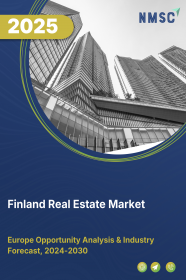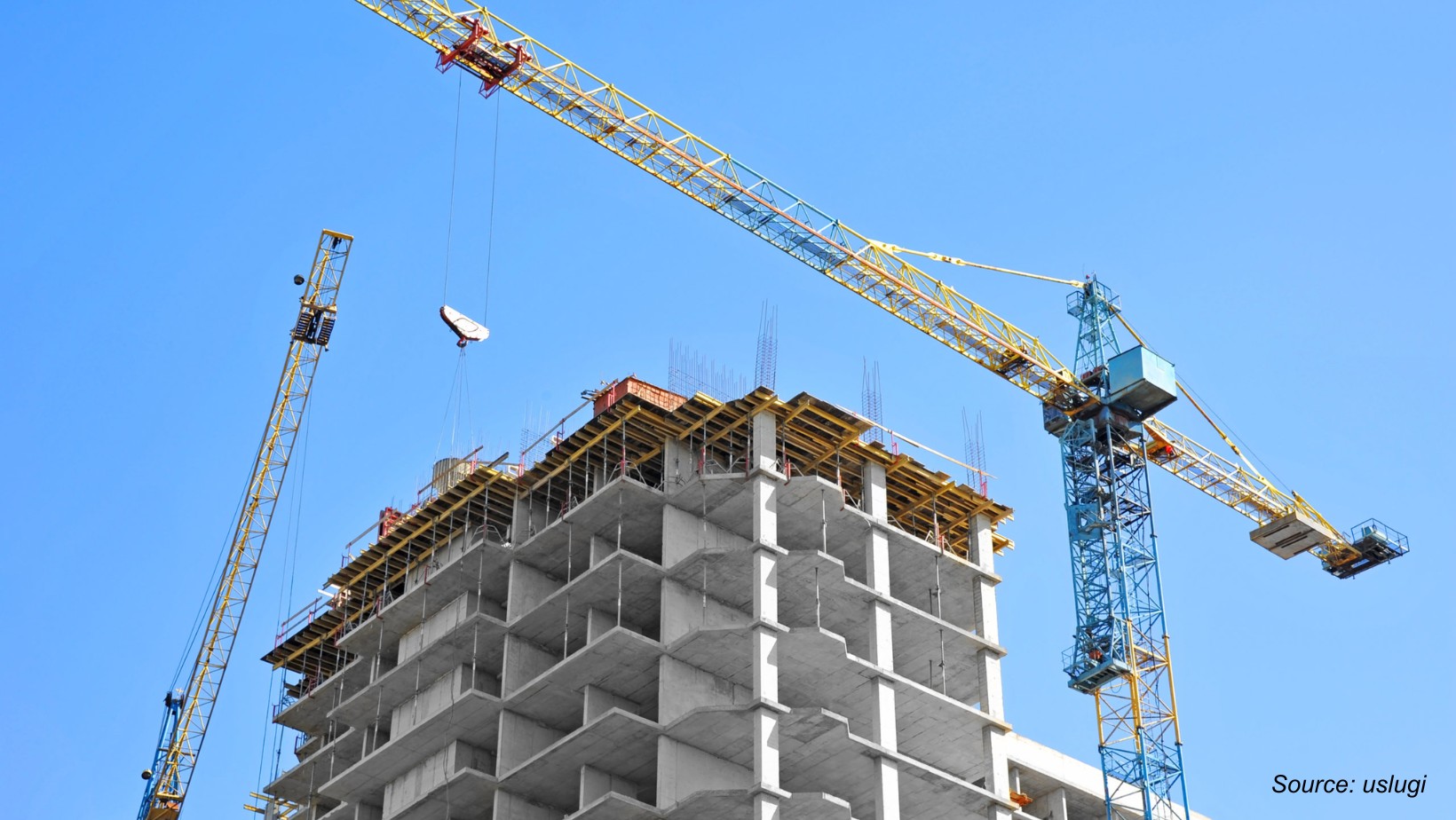
Finland Real Estate Market by Property Size (Small (<500 sq. ft.), Medium (500–2000 sq. ft.),and Others), by Property Type (Residential, Commercial, and Others), by Business Type (Buying, Selling, Leasing and Others), by Ownership (Owner-Occupied Properties, Rental Properties, Co-ownership), by Property Value (Affordable Housing, Luxury Housing, and Others), by End User (Individual Buyers, Business Entities, and Others) – Opportunity Analysis and Industry Forecast, 2025–2030.
Industry: Construction & Manufacturing | Publish Date: 28-Aug-2025 | No of Pages: 133 | No. of Tables: 144 | No. of Figures: 89 | Format: PDF | Report Code : CM1226
Market Definition
The Finland Real Estate Market size was valued at USD 97.7 million in 2023, and is predicted to reach USD 122.7 million by 2030, at a CAGR of 3.3% from 2024 to 2030.
The real estate industry constitutes a multifaceted market involving the acquisition, development, and management of residential and commercial properties. This expansive sector includes residential real estate, catering to individuals and families, as well as commercial and industrial real estate, focused on business operations and manufacturing. Real estate development involves the creation and enhancement of properties, while real estate investment encompasses acquiring properties for financial gain.
Additionally, a range of professional services, such as those provided by real estate agents and property managers, contributes to the industry's dynamics. Influenced by economic trends, demographic shifts, and regulatory factors, the real estate market is a complex landscape where various stakeholders engage in activities that shape urban environments, support economic growth, and provide investment opportunities.
Rapidly Growing Urban Population in Finland Drives Real Estate Market Expansion
Finland’s growing urban population is significantly contributing to the expansion of the country's real estate market. As more people migrate to cities like Helsinki, Tampere, and Turku, the demand for housing, commercial buildings, and supporting infrastructure continues to escalate. This demographic trend is reshaping urban planning strategies and stimulating construction activity in both residential and mixed-use developments.
For real estate developers and investors, understanding the shifting population dynamics in Finland is essential to making informed investment decisions. The growing need for modern, energy-efficient housing and commercial spaces presents a substantial opportunity to align offerings with the preferences of an increasingly urban, tech-aware population.
Rising Demand for Remote Work Solutions Fuels Real Estate Growth in Finland
The shift toward remote and hybrid work models in Finland has altered residential and commercial property preferences. Homebuyers are now prioritizing properties that offer home office setups, green spaces, and smart home technologies that support a better work-life balance. This trend is driving interest in suburban and secondary cities where space is more affordable without compromising on digital connectivity.
Moreover, Finland’s highly digitized society is accelerating the use of PropTech in the real estate sector. Virtual property tours, digital contracts, and data-driven decision-making are becoming standard practices. These technologies not only streamline the buying and selling processes but also empower real estate professionals to analyze market patterns and adapt quickly to changing consumer needs.
Policy Challenges and Economic Uncertainty Restrain Real Estate Momentum in Finland
Despite its growth potential, the Finland real estate market faces several regulatory and economic constraints. Zoning laws, environmental regulations, and tax policies can delay development timelines and increase compliance costs for developers. In high-demand areas, strict land-use controls may also limit the supply of new housing, affecting affordability and investor returns.
Economic variables such as inflation, interest rate fluctuations by the Bank of Finland, and global market volatility add further uncertainty to the sector. Developers and investors in Finland must navigate these challenges carefully, adopting flexible strategies that balance profitability with regulatory and economic risks.
Smart City Projects and Sustainability Goals Unlock New Opportunities in Finland
Finland’s commitment to building smart and sustainable cities is generating fresh momentum in its real estate market. Urban initiatives focused on digital infrastructure, energy efficiency, and low-emission construction are not only improving quality of life but also enhancing the investment potential of real estate projects. Cities like Espoo and Oulu are at the forefront of integrating smart technologies into urban planning.
Sustainability is now a core demand driver for Finnish homebuyers and commercial tenants. Properties featuring green certifications, energy-efficient systems, and renewable energy solutions are increasingly favored. As Finland advances its national sustainability agenda, real estate stakeholders who embrace green building practices and smart solutions will be best positioned to capitalize on future growth opportunities.
Competitive Landscape
The market players operating in Finland real estate market include Rakennusteho Group Oy, Kiinteistomaailma Oy, RE/MAX Finland, YIT Corporation, HGR Property Partners, Strand Properties S.L., Antilooppi Management Oy, RAKE OY, Cushman & Wakefield, Technopolis Holding Plc., CapMan, Kojamo Oyj, Sponda, CBRE, Jones Lang LaSalle IP, Inc. and others.
Finland Real Estate Market Key Segments
By Property Size
-
Small (<500 sq. ft.)
-
Medium (500–2000 sq. ft.)
-
Large (2000+ sq. ft.)
By Property Type
-
Residential
-
Apartments/Flats
-
Single-Family Homes
-
Multi-Family Homes
-
Condominiums
-
Townhouses
-
Vacation Homes
-
-
Commercial
-
Office Spaces
-
Retail Spaces
-
Co-working Spaces
-
Warehouses
-
-
Land
-
Urban Plots
-
Suburban/Rural Plots
-
-
Industrial
-
Manufacturing Plants
-
Distribution Centers
-
Data Centers
-
By Business Type
-
Buying
-
Selling
-
Leasing
-
Renting
-
Real Estate Investment
-
Direct Property Investment
-
Real Estate Investment Trusts (REITs)
-
By Ownership
-
Owner-Occupied Properties
-
Rental Properties
-
Co-ownership
By Property Value
-
Affordable Housing
-
Luxury Housing
-
Ultra-Luxury Housing
By End User
-
Individual Buyers
-
First-time Homebuyers
-
Repeat Buyers
-
Luxury Buyers
-
Seniors/Retirees
-
-
Business Entities
-
Startups
-
SMEs
-
Large Corporations
-
-
Government
-
Civic Projects
-
Affordable Housing Initiatives
-
-
Institutional Investors
Key Players
-
YIT Corporation (YIT Oyj)
-
Kojamo Oyj
-
Bonava AB
-
RE/MAX SUOMI OY
-
Rake Real Estate Oy
-
Citycon Oyj
-
Sponda Plc
-
Sato Oyj
-
Technopolis Oyj
-
Kiinteistömaailma Oy
-
Huoneistokeskus Oy
-
OP‑Kiinteistökeskus Oy
-
Nordic Real Estate Partner
-
Sp‑Koti Oy
-
Senaatti-Kiinteistöt
REPORT SCOPE AND SEGMENTATION:
|
Parameters |
Details |
|
Market Size in 2023 |
USD 97.7 Million |
|
Revenue Forecast in 2030 |
USD 122.7 Million |
|
Growth Rate |
CAGR of 3.3% from 2024 to 2030 |
|
Analysis Period |
2023–2030 |
|
Base Year Considered |
2023 |
|
Forecast Period |
2024–2030 |
|
Market Size Estimation |
Million (USD) |
|
Growth Factors |
|
|
Companies Profiled |
15 |
|
Market Share |
Available for 10 companies |
|
Customization Scope |
Free customization (equivalent up to 80 working hours of analysts) after purchase. Addition or alteration to country, regional, and segment scope. |
|
Pricing and Purchase Options |
Avail customized purchase options to meet your exact research needs. |

















 Speak to Our Analyst
Speak to Our Analyst

























